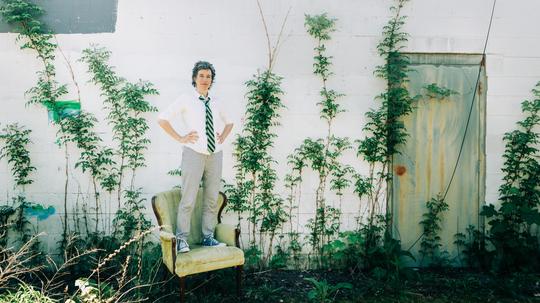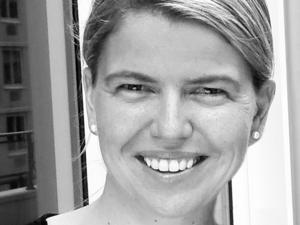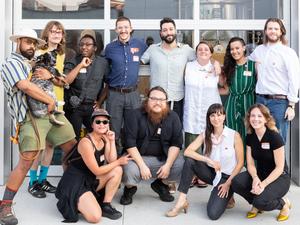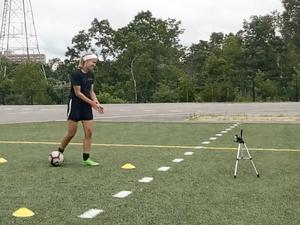
When the coronavirus pandemic hit, the 2020 Design Catalyst cohort was midway through a six-month program aimed at catalyzing their business growth.
Each year, DESIGNxRI runs a competitive application process to create a cohort of design businesses based in Providence that will receive grant funds (between $10,000 and 20,000, thanks to the City of Providence), business mentorship and business development trainings (thanks to Real Jobs RI) to grow their businesses. At the end of each program, called Providence Design Catalyst, the business owners get to show off their amazing work at an in-person showcase event surrounded by political, community and business leaders.
As a way to supplement the loss of this important, in-person event, the 2020 cohort designed an alternative with DESIGNxRI leadership: an online photo story series to highlight their businesses and share their success. This collaborative effort was created by members of the cohort, with a photographer from the group taking the portraits, a videographer shooting and producing a video and each designer submitting content, virtual video, photos and more to round out the material.
The series is being presented through DxRI’s marketing channel, Design is Rhode Island. Rhode Island Inno is excited to co-present this innovative story series. Over the next couple of weeks, we’ll highlight these great Rhode Island designers and help you get to know the diverse and wide ranging talent here in lil’ Rhody.
Tell us about your business!
The Bureau of Tactical Imagination helps small, digital business owners harness the skills and powers of visual storytelling and creative branding so they can build vibrant audiences and make an impact with their work. I do this through online education: courses, workshops, and now a membership community and resource library called The Visionary Syndicate, which hosts a comprehensive brand training program for small business owners called Build Your Visionary Brand.
What’s the story you are telling through your business? What’s your process, brand and philosophy?
The story I am telling is that when you create a brand—which is really the language and voice of your work and the way it becomes tangible to your audience—you are doing something that contributes to the culture around us.
So then the question is: With your brand, are you creating a culture that reproduces the conditions of our current world or breathes life into a vision we want to make more possible?
Whether you are selling your accounting services, your furniture design work, or your massage services, the way you operate and present your business to the world can be a kind of prototype of the future of work in that business. It can part ways with the things about your industry that no longer serve you, your people, or the world, and propose new alternatives. Taking that kind of creative leadership is both an opportunity to create a better culture, and to differentiate yourself in the market in a really powerful way, which helps grow your business.
Additionally, people think branding is a “set it and forget it” investment in your work, but branding is a continually evolving thing, especially in the social media environment. So it’s important for every small business owner to have branding skills and a strong grasp of their own creative vision as a brand-builder. They may hire someone to help them with a web site design for example, but the business owner needs to hold the vision.
I think it’s important to remember that everyone has inherent branding skills. Branding, when you strip it down to its elements, is about images, words, actions, experiences—the basic building blocks of communication. We all have those and we are all inherently creative. Everyone has the potential to be a visionary brand builder.

Why did you start your business? What’s your background in design, design-related or non-design fields?
I started my business in 2016 out of a desire to integrate the different parts of my life, work, and practice, in a way that was financially sustainable. After teaching art and design part-time at over 10 universities, while running a nonprofit part-time and upholding an art practice while raising a young child, I was ready for more financial and creative control over my life.
After a long life of making art—from painting to sculpture, to installation work to public experiments and interdisciplinary projects—I’m surprised to discover how very deeply entrepreneurship and branding have scratched my creative itches. I love nurturing communities of learners, designing curricula, doing my own branding art projects and generally being a big visual culture nerd for the business space.
What are some things you have achieved through the Catalyst grant?
There are three things the Design Catalyst grant gave me. The first was money—what this really means, is TIME. The funding gave me the time I needed to make the next leap, which was to prepare my business, in structure and programs, to scale—which for me means inviting triple to quadruple the number of students into my courses and training.
The second was mentorship. My Catalyst mentor Rachel Burnett was laser-focused on helping me achieve clarity in my products and messaging, which has been something I struggled to do on my own, being as close to the work as I am.
And the third, related to the funding and mentorship, was the space for a new offer to be born. With Covid-19 in full swing this spring, I created, marketed, sold and delivered a new course to 30 students in a short time frame.
The course taught small business owners how to use design thinking and creative processes to be nimble and adaptable in changing conditions, such as a changing economy. That course, called NIMBLE, is now an important part of my program structure.
What do you love about working in Rhode Island?
I love working in Rhode Island because of the land and ocean. Whether I am at my studio or working from home, I feel connected to the sea, and I know I’m just a short drive or even bike ride away from water and woods. And the local art, design and activist communities are so full of brilliant minds and good hearts.

What is a lesson you’ve learned so far while adapting and changing during this time?
One thing I have learned is that it’s easy to assume that because the economy is under stress, there will be fewer clients and customers for our work but that’s not necessarily true. The market is changing, not going away. And that presents us with a great opportunity to be creative, and find new ways to reach the folks who are looking for what we do.
Also, the changing economy and market give us a chance to take risks we might not have been comfortable taking when things seemed “normal.” This is a time of change in the world around us, so we get to make big changes to the way we work too—for the better, and in service of the world we want.
Another lesson I’m always learning, and now with the challenge of Black Lives Matter, is that I’ve got to keep looking at all of the systems and structures of my business, and elements of the communities I create in my programs, through the lens of racial justice and the automatic dominance of white culture when it’s not actively resisted. I’ve learned that my own good intentions and previous work on racism and oppression have become too stale, and that it’s time to reconnect and recommit to my values in this regard. So, my programs are changing in some core ways as a result, and I’m looking at all parts of my business freshly again.








